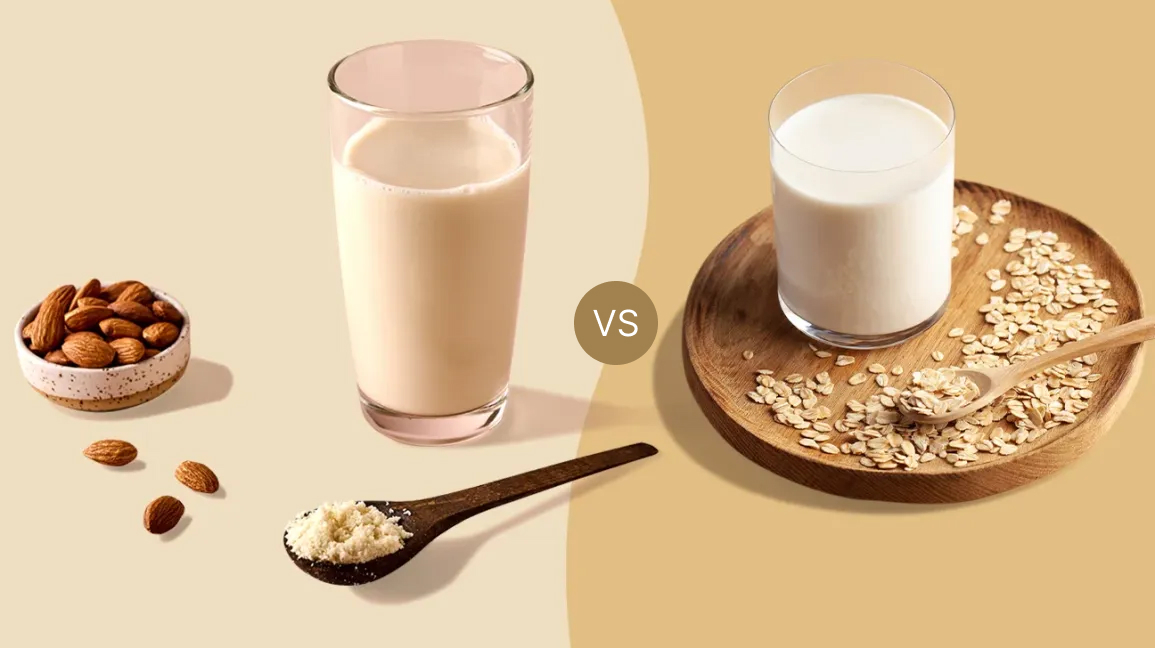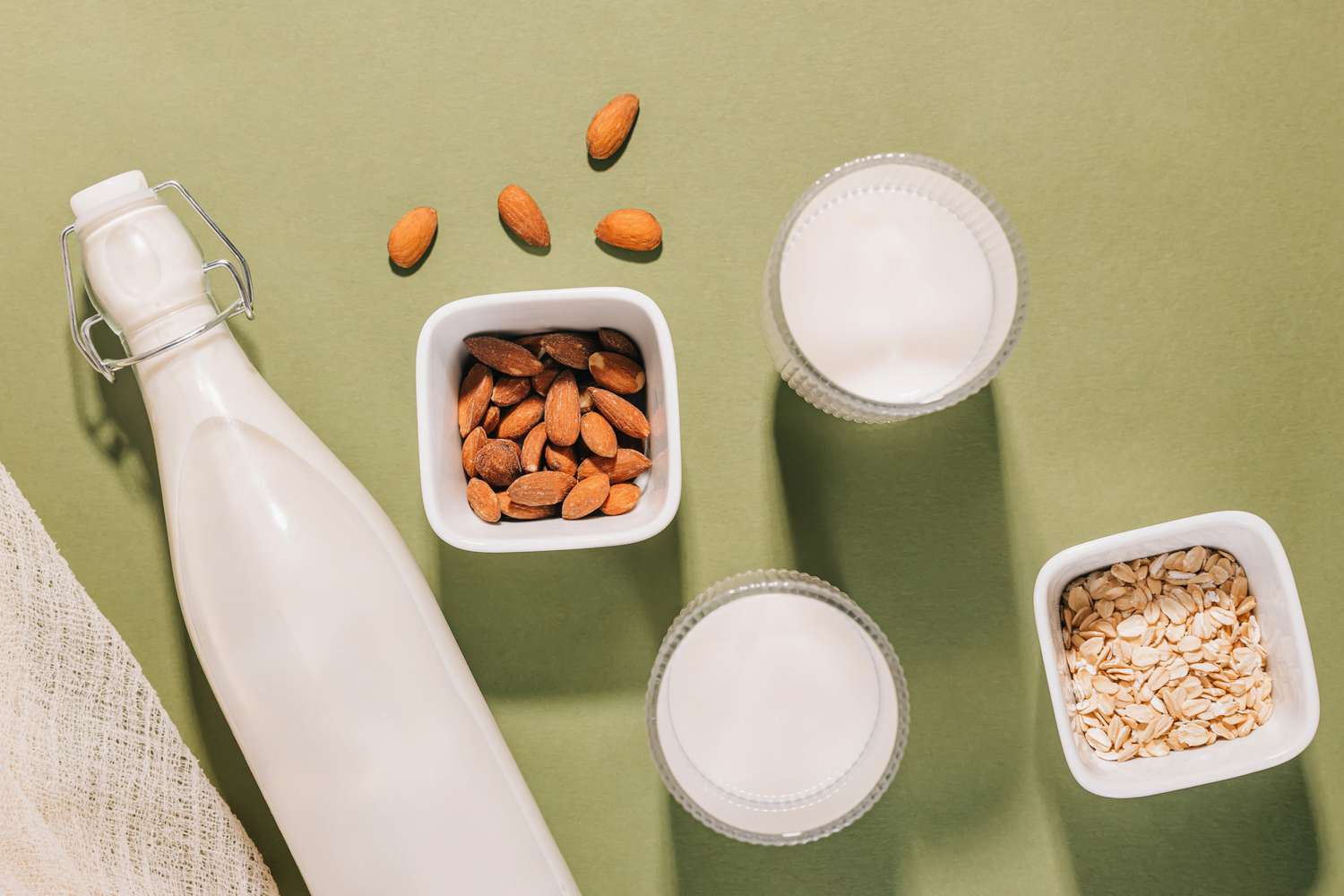Your cart is currently empty!
Oat Milk vs Almond Milk: Which Vegan Milk is Healthier for You?

Plant-based milk continues to be a vegan-favorite dairy product over the past few years. Although dairy milk has a richness of calcium, protein, vitamins A, D, and B12, the nutritious content in plant-based milk isn’t less valuable but rather different. You might have used several plant-based dairy products, but almond and oat milk remain the top choices nutrition-wise. But what’s the best source of nutrients between Oat Milk vs Almond Milk?
If you have tried both, you probably know which one tastes best. But it’s not just about flavor—it’s about how well they complete your daily needs for calcium, protein, and vitamins. While almond milk has been around since the mid-ages and holds the title as the best alternative to dairy milk, oat milk seems to be gaining popularity for its creamy texture and high fiber content.
So, to help our gym freaks and vegan friends decide between Almond milk vs Oat milk, we have come up with a detailed comparison. We will compare these two of the most demanding non-dairy milk options based on several aspects: nutrient-wise, taste, consistency, price, and more.
Detailed Comparison Between Oat Milk vs Almond Milk
Despite both being dairy milk alternatives, Oat and almond milk have a number of differences in terms of taste, consistency, and uses. To help you decide the best vegan milk option, here’s a detailed comparison between oat milk vs almond milk:
Nutritional Content
Oat milk generally packs more calories than almond milk. This might be a point to consider if you’re keeping an eye on your calorie intake. Oat milk is also higher in carbohydrates, especially the natural sugars from oats, making it a quick energy booster. It contains more protein than almond milk, which is great for muscle repair and growth, though it still has less protein compared to cow’s milk. Plus, oat milk is low in fat and typically free of saturated fats.
Conversely, almond milk is lower in calories, making it a fantastic option for those looking to shed some pounds. It has fewer carbs than oat milk, which is ideal if you’re on a low-carb diet. However, it doesn’t score high in protein. But, it makes up for it with healthy fats, like monounsaturated fats, which are good for heart health. Not to mention, it’s high in vitamin E, which helps protect cells.
Health Benefits
Let’s talk about the health benefits. Oat milk contains beta-glucans, which can help reduce cholesterol levels and promote heart health. Commercial oat milk is fortified with calcium and vitamin D, essential for strong bones. Oat milk also has a low glycemic index, meaning it raises blood sugar levels slowly, making it a good choice for people with diabetes.
On the other hand, almond milk is beneficial for heart health and has proven to reduce bad cholesterol levels. The vitamin E in almond milk is excellent for skin health, keeping it hydrated and protected from damage. Like oat milk, many almond milks are fortified with vitamin D and calcium – the essential nutrients for bone health.
Environmental Impact
Now, let’s consider the environmental impact. Oat milk generally has a lower water footprint compared to almond milk, which makes it more environmentally friendly in terms of water usage. Oats also require less land to grow compared to almonds, making oat milk a more sustainable option overall. In contrast, almond milk has a high water footprint because almond trees need a lot of water to grow. Almonds also require a significant amount of land, which raises concerns about environmental sustainability.
Taste and Texture
Oat milk has a slightly smooth, sweet taste that many people find appealing. It has a creamy texture much similar to dairy milk, which means it is the best choice for coffee, cereal, and smoothies.
On the other hand, Almond milk has a little nutty texture that can be a great addition to various recipes, though some might find it less versatile than oat milk. It is generally thinner than oat milk, which can be a downside for those who prefer a creamier consistency.
Allergies and Intolerances
If you have allergies or intolerances, this is something you will want to consider. While oats are naturally gluten-free, cross-contamination can occur during processing. It’s important to choose certified gluten-free oat milk if you are gluten-sensitive. The fiber content in oat milk can be beneficial, but it may cause digestive discomfort for some people.
At the same time, almond milk may not suit people with nut allergies, and you should better avoid it if you have a tree nut allergy. Some people might find almond milk easier to digest compared to other plant-based milk, but others may have issues with the added thickeners and emulsifiers used in some commercial almond milk.
Uses in Cooking and Baking
In terms of cooking and baking, oat milk’s creamy texture works well in coffee, tea, smoothies, and baking. It froths nicely for lattes and blends smoothly in recipes. Its mild flavor makes it a good substitute in both sweet and savory dishes.
Almond milk is also versatile but is particularly popular in smoothies, cereals, and as a drink on its own. It can be used in baking, but its nutty flavor makes it unsuitable for some recipes.
Cost and Availability
Cost and availability might influence your decision as well. Generally, oat milk can be slightly more expensive than almond milk, but prices vary depending on the brand and region. Oat milk has become widely available and is often found in online marketplaces, supermarkets, and health food stores.
Almond milk is usually affordable and widely available, making it a convenient option for many people. It’s easy to find almond milk in most grocery stores, often with a variety of flavors and types, including unsweetened, vanilla, and chocolate.

DIY at Home
If you’re into making your own vegan milk, oat milk is relatively more easy to make at home. Simply blend oats with water, strain, and you have fresh oat milk. You can customize the thickness and flavor to your liking, and making oat milk at home can be more affordable than buying pre-made versions.
Almond milk can also be made at home by blending overnight-soaked almonds with water and then straining the mixture, though it requires more preparation time due to the soaking process. Like oat milk, you can customize the flavor and consistency of homemade almond milk.
Fortification and Additives
Many commercial oat milk are fortified with vitamins and minerals, which further increase their nutritional levels. However, some oat milk may contain added sugars, thickeners, and preservatives, so it’s essential to read the labels if you prefer a cleaner product.
Almond milk is also fortified with essential vitamins and minerals, improving its nutritional profile. Similar to oat milk, commercial almond milk may include additives such as sugars and thickeners, so always check the labels to choose the healthiest option.
Ethical Considerations
Ethical considerations might also play a role in your choice. Oat milk is often considered more environmentally friendly due to lower water and land usage. As a plant-based product, oat milk does not involve animal exploitation, making it a good choice for those concerned about animal welfare.
The high water usage for almond cultivation raises concerns about environmental sustainability. Like oat milk, almond milk is a plant-based product and does not involve animal exploitation.
Conclusion
So, which one is healthier for you? Both oat milk vs almond milk have their unique advantages and can be a healthy addition to your diet. Your choice between the two should depend on your nutritional needs, taste preferences, environmental concerns, and potential allergies.
Oat milk is great if you want a creamy texture, more protein, and higher fiber content. It’s also a better option if you are concerned about water usage and sustainability.
Almond milk is ideal if you’re looking for a lower-calorie option with healthy fats and high vitamin E content. It’s widely available and has a nutty flavor that can complement many recipes. Ultimately, both types of milk can fit into a healthy diet.
FAQs
What’s Healthier, Oat Milk or Almond Milk?
Both oat milk and almond milk have their unique health benefits. Oat milk is higher in calories and carbohydrates, but it also provides more protein and fiber, which is great for digestion. Almond milk, on the other hand, is lower in calories and carbs, and it’s high in healthy fats and vitamin E. The choice between the two depends on your dietary needs and preferences.
Is Oat Milk Good for You?
Yes, oat milk is generally good for you. It contains beta-glucans, which can help lower cholesterol levels and promote heart health. It’s also a good source of vitamins and minerals, especially when fortified. Additionally, oat milk is high in fiber, which aids digestion. However, it’s higher in carbohydrates, so it’s essential to consider your dietary needs when including it in your diet.
Is Oat Milk Gluten Free?
Oat milk can be gluten-free, but it’s important to check the label. Oats themselves are naturally gluten-free, but they can be contaminated with gluten during processing. Look for oat milk that is certified gluten-free to ensure it’s safe for those with gluten sensitivity or celiac disease.
Can Dogs Have Almond Milk?
Yes, dogs can have almond milk in moderation, but it’s not necessary for their diet. Make sure it’s unsweetened and free of additives like xylitol, which is toxic to dogs. Almond milk shouldn’t replace regular water and balanced dog food but can be an occasional treat. Always consult with your vet before introducing new foods to your pet’s diet.
Which is Better, Oat, Soy, or Almond Milk?
The choice between oat, soy, and almond milk depends on your nutritional needs and preferences. Oat milk is creamy and high in fiber, soy milk offers high protein content and is closest in nutrition to cow’s milk, and almond milk is low in calories and rich in vitamin E. Each has its benefits, so consider your dietary requirements when choosing the best option for you.
Leave a Reply